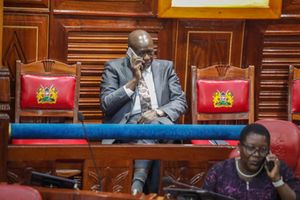
Senate Speaker Amason Kingi (left) and his National Assembly counterpart Moses Wetang'ula.
Football-crazy countries such as Kenya should know by now that any game is reliant on a referee who is unbiased and controlled on their use of the red card. The English Premier League has one of the largest fan bases in Kenya perhaps than in most African countries.
I am speaking anecdotally, of course. Every Kenyan has an EPL team (s)he supports. Our politicians have theirs, too, and are not ashamed to turn out with T-shirts of their beloved EPL team to support them at home and in bars, despite their constituencies not even being able to host a game in a muddy field.
The enjoyment of the EPL games would not be universal if the referees turned a blind eye to foul play, ignored match-fixing attempts and even decided to score for a team to influence a game. If all the three things happened consistently, many fans would be irked beyond belief. In some cases, such behaviour has even led to suicide by superfans of a team. God forbid!
The behaviour of the speakers and their deputies in our bicameral Parliament (the National Assembly and the Senate), have been behaving like a bribed Fifa referee whose main work is to throw away the game and influence the results on behalf of some organised criminals.
Fixed matches
Just like bad football referees, parliamentary speakers have fixed matches and even scored own goals for the government to influence decisions. How is this done? Firstly, by coming out in the open and giving support to the government as an interested party, however unpopular a policy is.
Secondly, by influencing votes and undermining dissenting voices. Speakers of the National Assembly are by nature of their jobs meant to be impartial. That is why the Constitution does not give the speaker the ‘right to vote’ on any substantive issue on the floor of the House. The speaker and the deputy are elected by the whole house and not just one party, hence putting the requirement of impartiality and fairness at the top of their role.
In the recent past, speakers of the House and their deputies have behaved in a manner that has brought the role of the Senate and the National Assembly into disrepute by acting in favour of the party in government and influencing decisions on its behalf. The role of the opposition has also been weakened after several opposition figures were given positions in government, but that does not diminish the impartiality with which the speakers and their deputies need to work.
Bias
By behaving in a partial manner, the speakers have in fact undermined democracy. What is more, they have failed constituents by allowing MPs to go unpunished when they fail to participate in the day-to-day activities of Parliament.
The recent impeachments, and the controversial laws passed, have shown how MPs’ participation in Parliament is selective and only turning up to influence the work of the government when numbers are needed to boost votes and not when MPs are needed to vote on matters affecting voters’ welfare. Quorum hitches in Parliament have been reported many times, especially on important issues affecting the public, but the speakers have yet to find a way to get MPs on their seats when required to serve the public.
To use the football analogy again, most MPs should be on a recall by now for non-attendance in Parliament. If a football team fails to turn up to a game, the opponents get a walk-over.
In this case, the MPs who do not wish to serve the public should be sent home and give way to those who want to serve. Many Kenyans up and down the country would lose their jobs if they failed to turn up to work for months without a valid excuse. Why should MPs get away with breaching employment rules?
Politicians are making a mockery of the voters and democracy in the country. They want the privileges and the salaries that come with the role but do not appear to want to get their hands dirty for those that elected them, but willing to soil them even with blood to pass unpopular and punitive policies to appease the government of the day. This is something that speakers have allowed to happen by failing to take their roles seriously and understand their key roles in the Houses of Parliament.
Firstly, speakers and their deputies should have no opinion on matters before the floor of the house or in the public domain. Whether they give that opinion in Parliament or on TV is immaterial. The fact is, they must always remain impartial. Politics in Kenya is bad and dangerous, because politicians are unwilling to adhere to the rules, including the speakers themselves.
Secondly, there should now be a scheme put in place to penalise MPs who fail to turn up to work for their constituents on a full-time basis. This punishment should be of big fines, refused salaries and even loss of their seats if need be.
Ms Guyo is a legal researcher. [email protected], @kdiguyo








